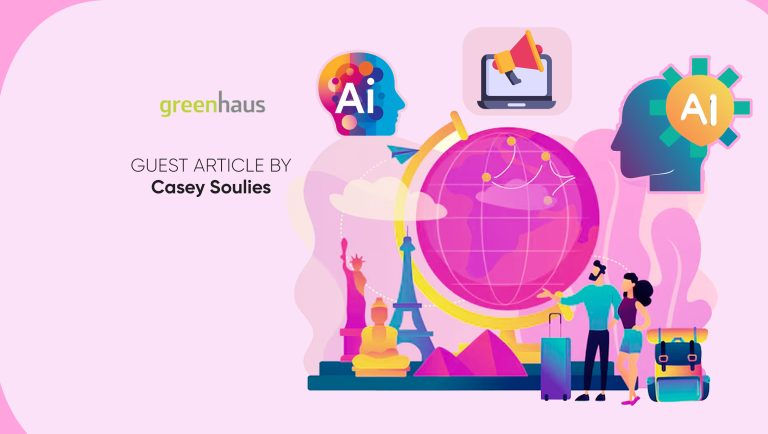AI is a Game Changer for Tourism

Artificial intelligence (AI) is revolutionizing the tourism industry in ways that are reshaping traveler behaviors and the marketing landscape. From new methods of gathering information to redefining personalization and engagement, AI is how travel is planned and booked – opening new opportunities for advertisers. This evolved form of travel planning forces brands to rethink how they connect with audiences in six very specific ways:
AI Evolves the Consumer Journey and Demands Evolution from Operators
AI platforms like ChatGPT or Google Gemini are changing how consumers gather information. For years, it was widely understood that the consumer journey involved numerous visits to many websites (and platforms)—from DMO websites to Tripadvisor, to OTAs (like Expedia), directly to hotels, and back to social platforms—to gather intel and ultimately plan your vacation. While this might still be the process for many, you don’t have to squint too hard to see a dramatically different future.
AI’s ability to deliver all of this information in a single response and adjust based on individual feedback will streamline the consumer experience. But it also threatens to cut many of the previously mentioned sources (websites) out of the mix entirely, making it imperative that brands embrace this shift and begin to deliver an integrated AI offering and discoverable content to aid LLMs.
Taking Advantage of Advanced Personalization
AI has elevated the ability to craft hyper-personalized travel experiences, curate content and deliver personally relevant responses. From a consumer perspective, personalized responses that directly answer your planning questions will build trust (and usage), slowly making other sources feel generic and less relevant. With this in mind, brands must act and meet rising consumer expectations.
Curating Unique Experiences:
Leveraging AI to offer travelers tailored suggestions based on their preferences, previous bookings and real-time behavior.
AI Planning Assistants:
Take control of the conversation by integrating AI tools into your content and website experience, meeting expectations of personalization and providing an opportunity to collect advanced audience data.
Marketers Need to Rethink The Website Experience
Destinations must invest in AI systems that centralize content and improve engagement. Traditional static websites must give way to dynamic, AI-driven platforms that adapt to user behavior and provide a more responsive experience.
Interactive Content:
Marketers can repurpose branded content, itineraries and destination assets to allow audiences to dynamically navigate the website and curate a custom experience.
Functional AI Assistants will Become the Norm for Booking and Modifications
AI-powered virtual assistants are reshaping how travelers book and modify trips. While not all brands will be able to drive bookings, connectivity with those platforms and ease of use will be critical, as this is what consumers will seek (and become accustomed to).
Seamless Transactions:
Users can research, book, and adjust itineraries through centralized AI systems without navigating multiple platforms. Integrations will be necessary to foster this type of environment.
24/7 Brand Assistant:
Functional assistants ensure 24/7 support, answering questions and helping plan custom vacations and trips whenever convenient to the customer. How these users are trained and the type of content available is the foundation of success. Customers’ expectations will only rise, so a simple ChatBot will not be sufficient – access to a travel assistant who knows the destination better than any other source is what we strive for.
Search Advertising and Information Discovery Grows in Importance with AI
Search advertising has seen a dramatic shift with AI-driven tools. The race to own the AI-search space is the first significant battleground in the AI ad space. Google’s dominance in the category is now threatened by AI systems that make information discovery easier, faster and more personalized than ever before. While information accuracy will be a concern initially, this will soon fade as content partnerships and data integrations continue to unfold. The centralized information and ease of access will reshape search entirely – both how people search and where it occurs – leading to a massive shift in consumer (and marketer) behavior.
Advertisers need to begin testing now to respond to this shift. The space is still evolving, and early learning is critical to future success:
Test AI Search Platforms:
A growing number of platforms have entered the space, and identifying new ways of advertising and being featured is an early step. Understanding the relationship between AI models and processing new information is mainly out of a brand’s control, but it is important to understand as this evolves.
A Push for Inspiration Will See a Renewed Focus
With a significant shift in planning and booking travel, there is a significant gap in a big part of the consumer journey that AI does not currently own: Inspiration creation. AI can drive excellent returns for audiences with an idea of what they want to do or where they want to go, but inspiration creation is not currently an area of strength. As such, marketers can take advantage and shift strategies up the funnel to touchpoints that drive interest and intent – ultimately creating demand that feeds the planning cycle. So, while not a technical change, this represents a potential shift in strategy and approach toward initial audience communication.
So What Does this Mean for Tourism Digital Marketers?
AI is not just transforming how we market travel; it’s redefining the very fabric of the tourism industry. For advertisers, this shift is an opportunity to combine data-driven precision with creativity and inspiration. By advertising AI solutions and focusing on personalization, engagement, and branding, we can craft experiences that resonate deeply with today’s travelers and pave the way for the future of tourism.
Comments